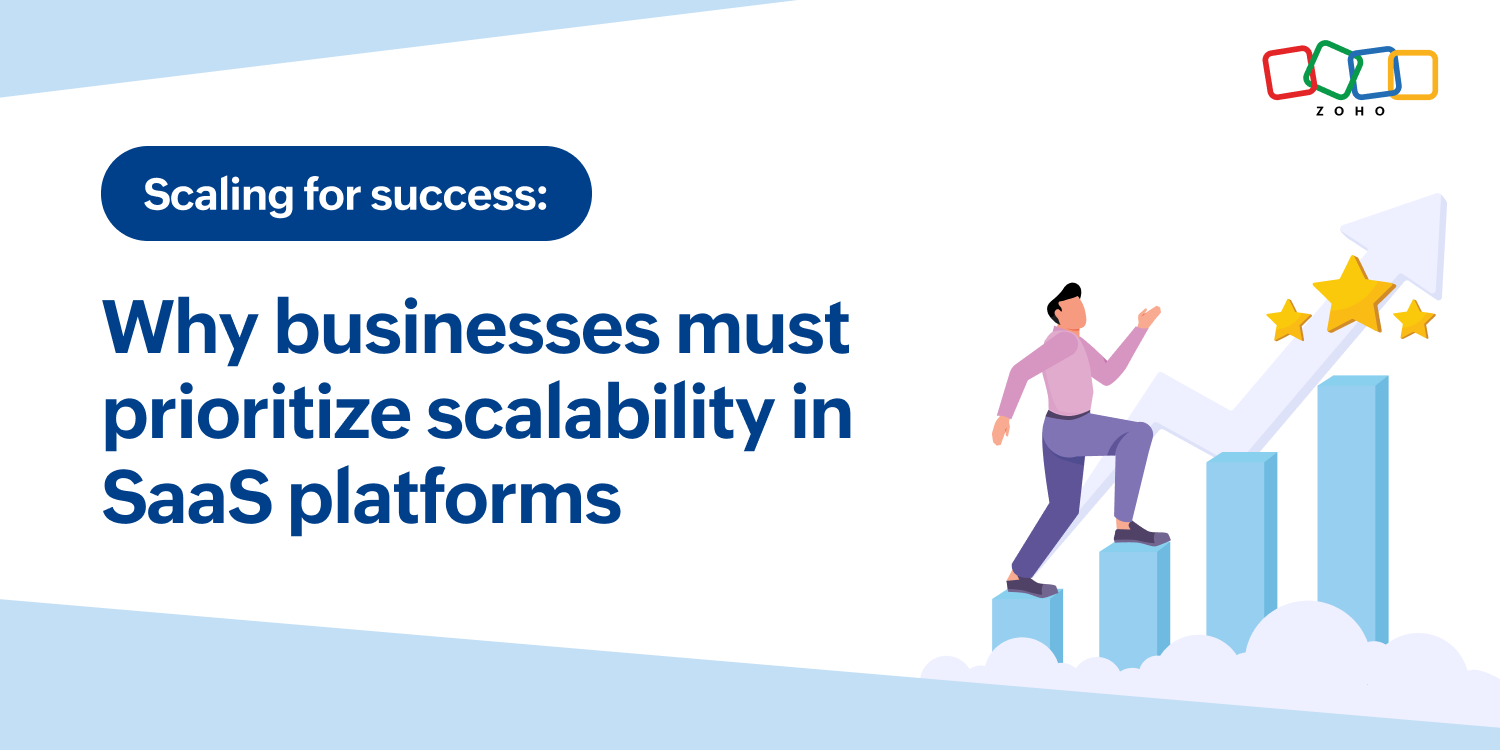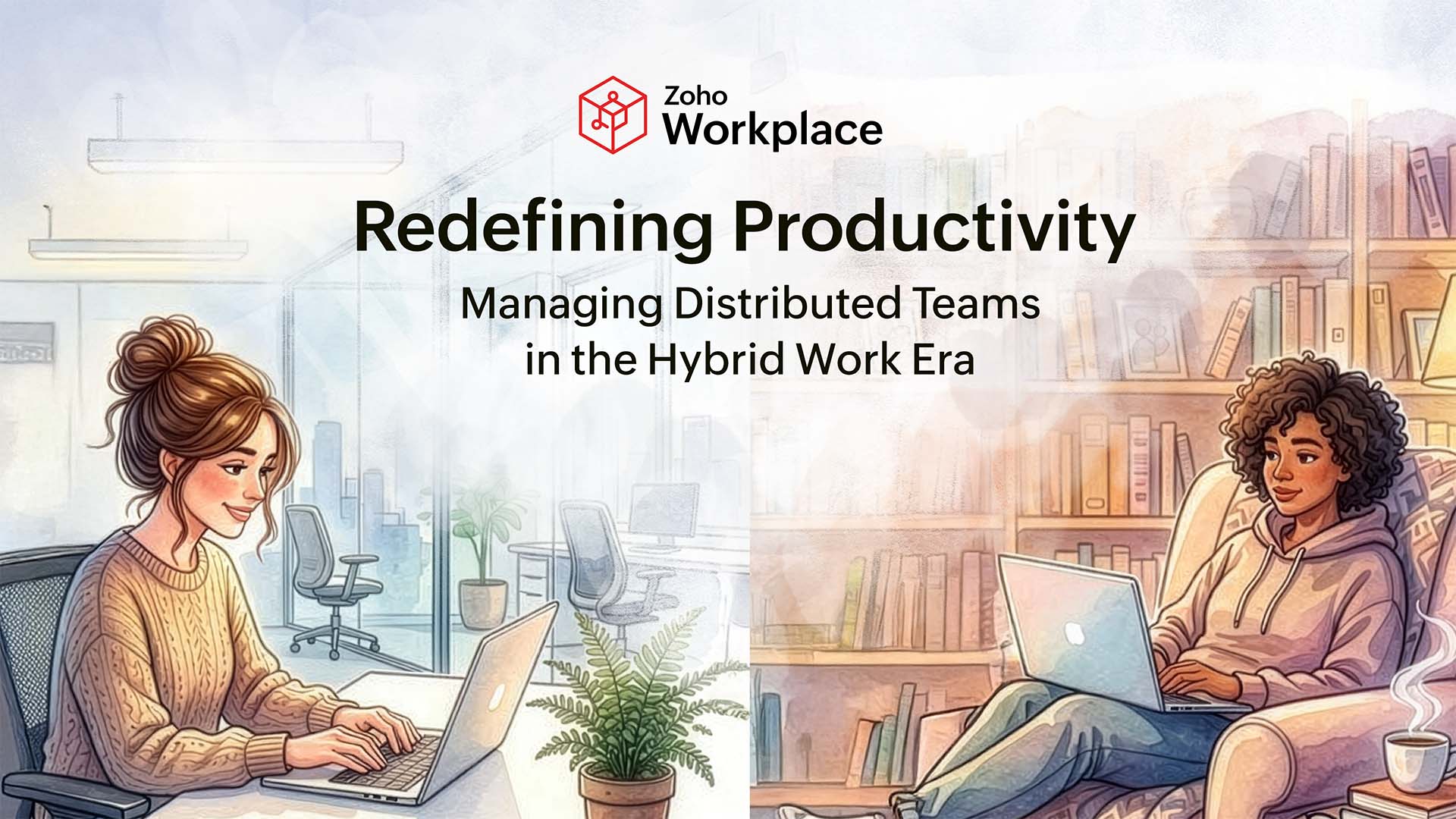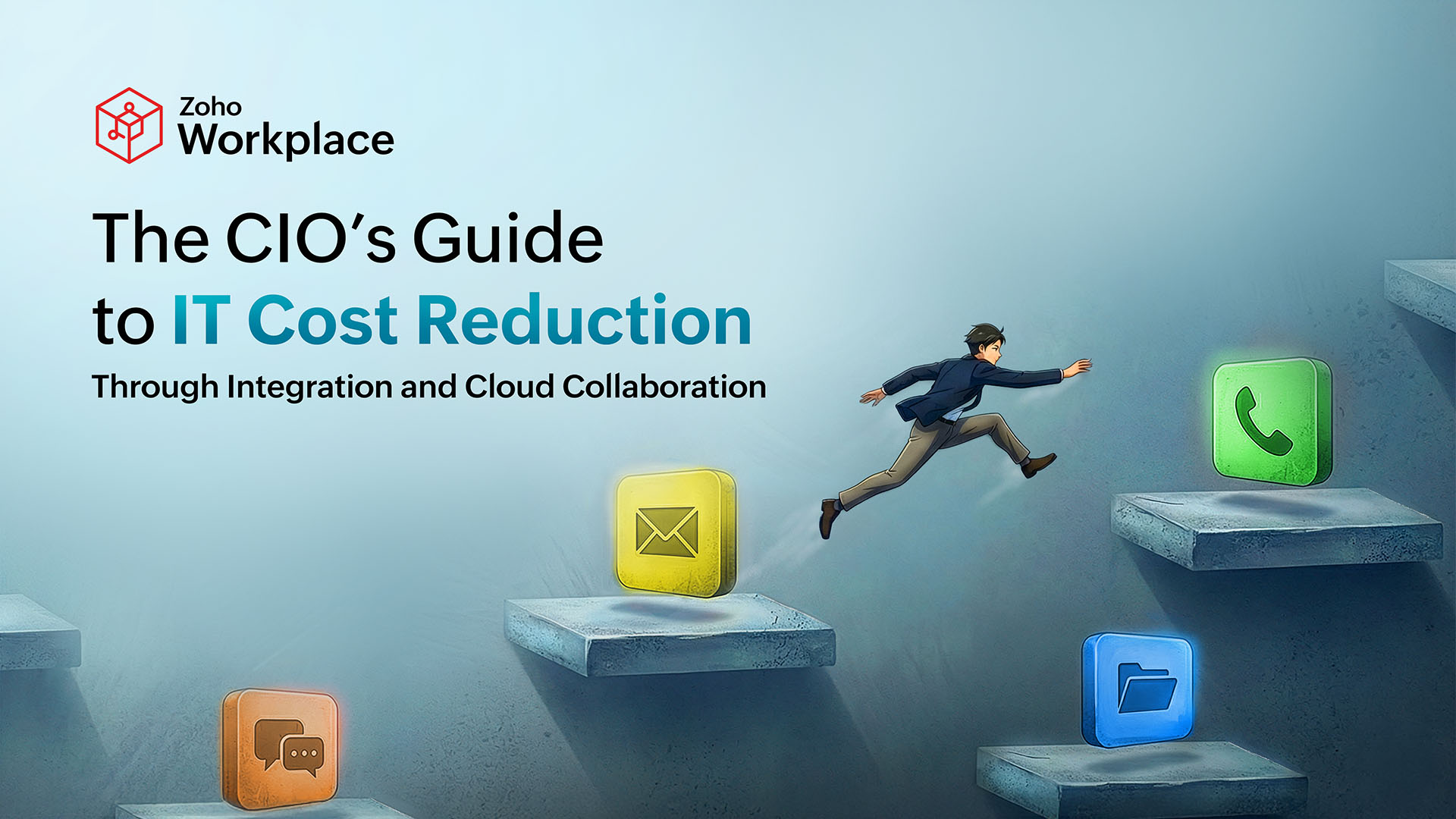- HOME
- All Topics
- Thought Leadership
- Scaling for success: Why scalability in SaaS is a must for business growth
Scaling for success: Why scalability in SaaS is a must for business growth
- Published : September 25, 2025
- Last Updated : September 25, 2025
- 761 Views
- 11 Min Read
Business scalability isn’t optional—it’s essential.
Every business begins with a vision for growth. As that vision becomes reality, your tools and technology must evolve, too.
The demand for SaaS solutions is rising quickly, as more businesses turn to cloud-based tools to simplify operations and boost productivity. Forecasts suggest that the global SaaS market could grow to nearly $1.23 trillion by 2032—highlighting its critical role in the future of business technology.
When choosing a SaaS platform, it’s not just about what works today but also about what can grow with you tomorrow. Scalable software helps your team stay agile, work efficiently, and stay ahead of the competition in the long haul.
In this article, we break down why scalability is crucial for every business looking to adopt SaaS platforms, the key benefits of a scalable platform, and how to evaluate SaaS solutions to ensure they can grow with you.

What is business scalability?
Scalability is the ability of a business to grow without being held back by its systems, tools, or processes. It means your company can handle more customers, more work, and more complexity— all without losing efficiency or quality.
Whether you're adding new team members, expanding into new markets, or launching new products, scalability ensures that your operations can keep up. In fact, 70% of CIOs say scalability is among the top motivations for using SaaS apps.
- Scaling up means handling larger volumes such as more users, data, or transactions without compromising performance.
- Scaling out means extending functionality like adding new features, supporting new geographies, or integrating with other tools without disruption.
In the world of SaaS, business scalability means your software grows with you.
From the early days of launching a startup to the complex demands of running a large enterprise, your business needs tools that can keep up. A scalable SaaS platform is designed to support you through every stage of growth. It doesn't require expensive migrations, disruptive upgrades, or switching to entirely new systems.
As your team expands, your customer base grows and your operations become more sophisticated. A scalable platform adapts—adding features, users, and integrations as needed. This flexibility saves time, reduces costs, and ensures that your technology remains a reliable partner in your success.
Why business scalability matters in SaaS platforms
Business scalability in a SaaS platform goes beyond just handling more users or data. It’s a key driver of business success.
1. Cost efficiency
Scalable platforms save money over time. Non-scalable tools may work well at first, but as your business grows, they often hit limits. They force you to pay for expensive upgrades, switch systems, or rebuild workflows. Scalable SaaS avoids these disruptions by adapting to your needs without costly replacements.
2. Business agility
When your software can scale, your team can move faster. Whether you're expanding into new markets, launching new products, or onboarding more users, scalable tools help you respond quickly without slowing down operations.
3. Operational stability
Growth shouldn’t mean growing pains. Scalable platforms maintain performance and reliability even as demand increases. That means fewer outages, smoother workflows, and better customer experiences.
4. Long-term value
Investing in scalable SaaS is a strategic move. It sets your business up for sustainable growth, reduces future risks, and ensures that your technology continues to support your goals—not hold them back.
Signs a SaaS platform is truly scalable
Not all SaaS platforms are built to grow with your business. A truly scalable solution does more than handle extra users; it supports long-term growth without causing friction, delays, or costly changes. Here are the key signs to look for.
1. Flexible user and feature expansion
You can easily add users, roles, or features without needing a complete overhaul. Whether you're a startup or scaling globally, the platform adjusts to your team size and business needs.
2. Performance under pressure
Scalable platforms maintain speed and reliability even as demand increases. There are no lags, no crashes; they deliver consistent performance as your data, traffic, and workload grow.
3. Integration-ready architecture
It connects smoothly with other tools and systems. Scalable SaaS doesn’t operate in a silo—it plays well with your existing tech stack and future additions.
4. Tiered pricing and customization options
You’re not locked into a one-size-fits-all plan. Scalable platforms offer pricing tiers, modular features, and customization so you only pay for what you need and can upgrade when ready.
5. Automation and workflow support
As your operations grow more complex, scalable platforms help you streamline. Built-in automation, smart workflows, and admin controls make it easier to manage growth without adding manual work.
6. Proven track record
Look for platforms that have successfully supported businesses through different growth stages. Case studies, customer testimonials, and industry recognition are good indicators of scalability in action.
7. Strong security and support
As your business grows, so do your security needs. A scalable platform will have robust security measures and a responsive support team that can handle more users and more complex issues. Good support is a sign that the company is prepared to grow with you.
The risk of overlooking business scalability
Ignoring scalability can lead to costly setbacks, lost opportunities, and operational headaches. Here’s what’s at stake when scalability is overlooked.
1. Costly upgrades and migrations
Non-scalable platforms often hit a ceiling. As your business grows, you'll reach a point where your old software can't keep up. This forces you to make a difficult choice: Either struggle with a slow, inefficient system or spend significant time and money on a complete software migration.
Switching platforms is a massive undertaking. It can disrupt your daily operations, cause temporary loss of data, and require extensive training for your team. This isn't just an IT problem; it's a business problem that can stall your momentum and cost you a lot of money and time.
2. Slower growth
If your tools can’t keep up, your growth slows down. Teams spend more time fixing problems than driving progress. You might miss opportunities to take on new clients, launch new products, or expand into new markets because your technology simply can't handle the increased demand.
3. Poor user experience
As demand increases, non-scalable systems may lag, crash, or become difficult to manage. This leads to frustration for both your team and your customers, hurting productivity and brand reputation.
4. Increased risk and security issues
As your user base grows and your data volume increases, non-scalable platforms may become less secure. They might not have the robust security features or reliable support needed to protect your business from modern threats. This leaves you vulnerable to data breaches, which can damage your reputation and lead to serious financial and legal consequences.
By not choosing a scalable platform, you're not saving money; you're simply delaying a larger, more painful problem.
5. Competitive disadvantage
In fast-moving markets, agility is key. Scalable businesses can adapt quickly, launch faster, and stay ahead. Those stuck with rigid systems risk falling behind competitors who are built for growth.
The benefits of prioritizing business scalability from the start
When you invest in a scalable SaaS platform early on, you're not just buying a tool for today; you're building a foundation for long-term growth.
1. Seamless growth
With a scalable platform, you can expand your business without worrying about your technology holding you back. You can add new users, launch new products, and enter new markets without a complete and costly overhaul of your system.
This allows you to stay focused on your business goals and take advantage of new opportunities as they arise, instead of being slowed down by technical limits.
2. Predictable costs
A non-scalable solution can hit you with an expensive surprise down the road, forcing you to pay for costly upgrades or a full platform migration.
In contrast, scalable platforms often have flexible subscription models that adjust to your usage. This means you only pay for the users and features you need, and the costs grow predictably with your business.
3. Improved productivity
When your business outgrows its tools, your team is forced to spend time and energy adapting to a new system. This can be a major distraction that pulls them away from their actual work.
A scalable platform, on the other hand, grows with you. Teams can continue to use the same familiar tools, adding new features and users as needed without a disruptive overhaul. This allows everyone to stay focused on their tasks, collaborate effectively, and remain productive.
4. Better customer experience
As your business grows, your platform will need to handle more users and a higher volume of activity. A non-scalable solution will slow down under pressure, leading to frustrating performance issues for your customers.
In contrast, a scalable platform maintains its speed and reliability, no matter how much you grow. This consistent, high-quality performance builds customer loyalty and trust, turning new users into long-term advocates for your business.
5. Better ROI
A non-scalable solution has a limited lifespan. Once you outgrow it, its value disappears, and you have to invest in a completely new platform.
A scalable platform, however, protects your initial investment. The technology remains valuable over time because it can continue to serve your business as it grows. This turns your initial software purchase into a long-term asset that grows with you, delivering value for years to come.
How to evaluate SaaS platforms for business scalability
Choosing a software partner that can grow with your business is a strategic decision. When you're assessing different platforms, use a practical checklist to guide your decision. Here are some key questions you should always ask.
1. How does the system handle increased users, data, or workloads?
Don't just take the vendor's word for it. Ask for specific details on how their platform is designed to scale. A good vendor should be able to explain how their system handles:
- Adding new users: Can you quickly add hundreds of new employees to the system without a dip in performance?
- Managing more data: As your data grows from megabytes to terabytes, will the platform remain fast and responsive?
- Handling increased workloads: Can the system handle a spike in activity—for example, during a holiday season or a major marketing campaign—without slowing down or crashing?
A vendor who can provide clear answers and technical details on these points is likely offering a truly scalable solution.
2. Can you activate only the features you need, and expand later?
One of the strongest indicators of a truly scalable SaaS platform is modular design. This means the software is built with individual components or features that can be activated as needed—like building blocks you can add over time.
Instead of being forced into a one-size-fits-all package, modular platforms let you start small and grow smart. You can choose only the features your business needs today, and expand later as your operations evolve. Whether it’s adding advanced analytics, automation tools, or integrations with other systems, a modular design gives you the flexibility to scale without disruption.
This approach offers two major benefits:
- Cost efficiency: You only pay for what you use. As your business grows and your needs become more complex, you can easily add new features or upgrade to a more advanced plan.
- Simplicity: You avoid the clutter and complexity of having a dozen features you’ll never use. This keeps the platform simple and easy for your team to use, allowing for smoother adoption.
Essentially, you build a solution that matches your workflow, not the other way around. A platform with a modular design shows that it was built with growth in mind, giving you the flexibility to adapt and expand without the need for a costly migration.
3. Does it work smoothly with your existing ecosystem of tools?
Did you know that companies with more than 10,000 employees use, on average, 447 SaaS applications?
A truly scalable SaaS platform doesn’t operate in isolation. It’s designed to work as part of your broader business ecosystem. That means it should connect easily with the tools you already rely on, like your CRM, marketing software, accounting systems, and other operational platforms.
Integration isn’t just a convenience but a critical test of scalability. As your business grows, so will your tech stack. You’ll likely adopt new tools, automate more processes, and expand into new markets. If your core platform can’t keep up—if it struggles to integrate or forces manual workarounds—it quickly becomes a bottleneck.
On the other hand, a platform with strong integration capabilities acts as a central hub. It allows data to flow smoothly between systems, reduces duplication, and supports a unified workflow across departments. This kind of connectivity boosts efficiency, improves decision-making, and helps your team stay agile as demands increase.
When evaluating scalability, don’t just look at user limits or performance benchmarks. Ask:
- Can this platform connect with the tools we use today?
- Will it support the tools we’ll need tomorrow?
- Does it help us build a flexible, future-ready tech ecosystem?
4. Are there measures to support data and legal requirements globally?
As you expand internationally, the ability to meet global standards becomes a critical part of scaling safely and sustainably.
Serving clients or customers in other countries means navigating a complex landscape of data privacy laws, security standards, and regional regulations. From GDPR in Europe to CCPA in California and other global frameworks, compliance is essential.
A truly scalable SaaS platform is built with this in mind. It doesn’t just perform well; it protects your data and respects the legal requirements of every region you operate in. That means having strong security protocols, clear data governance policies, and built-in support for international compliance.
When evaluating a platform’s scalability, ask the vendor:
- How does your system handle global data privacy laws?
- What security measures are in place to protect sensitive information?
- Can you provide documentation or certifications that prove compliance?
If your platform isn’t compliant, you risk fines, legal action, and damage to your reputation.
5. Does pricing allow you to scale gradually without overpaying upfront?
A truly scalable SaaS platform doesn’t just support your operations, it also supports your budget. One of the clearest signs of scalability is a pricing model that grows with your business, not ahead of it.
Be cautious of vendors that push you into large, expensive plans right from the start even when you only need a few core features. These one-size-fits-all packages can drain resources and lock you into commitments that don’t match your current needs.
Instead, look for platforms that offer flexible, modular pricing. This means you can:
- Start with a basic plan that fits your current team size and feature requirements.
- Add users, tools, or capabilities as your business expands.
- Pay only for what you use, when you need it.
This kind of pricing model protects your budget and gives you room to grow at your own pace. It also makes forecasting easier because your software costs scale predictably alongside your business, without surprise fees or forced upgrades.
When evaluating a SaaS platform, ask:
- Can we start small and scale up gradually?
- Are there hidden costs or bundled features we don’t need?
- Does the pricing model support long-term growth without financial strain?
6. Does the platform have proven examples of handling enterprise-level growth?
When evaluating a SaaS platform’s scalability, ask for proof rather than just taking the vendor’s word for it. Claims are easy to make, but the real test lies in how the platform performs under pressure, especially at enterprise scale.
A truly scalable solution will have proven, real-world examples of businesses that started small and grew significantly using their service. These case studies are more than marketing; they’re evidence that the platform can handle complex demands, large user bases, and high-volume data without breaking down.
Look for stories that show:
- Successful onboarding of thousands of users across teams or regions.
- Smooth handling of massive data loads and real-time processing.
- Support for complex workflows, integrations, and compliance needs.
- Consistent performance during periods of rapid growth or peak demand.
These examples demonstrate that the platform isn’t just scalable in theory but also scalable in practice. It’s been tested, trusted, and proven in environments where failure isn’t an option.
When speaking with vendors, ask:
- Can you share case studies from enterprise clients?
- What challenges did those businesses face, and how did your platform help?
- How does your system scale across different industries or use cases?
The business scalability of Zoho Workplace
Zoho Workplace is an ideal choice for businesses looking for a solution that can grow with them, no matter how fast they expand. It's built on a foundation of scalability, offering a unified platform that adapts to your needs.
Flexible pricing
With Zoho Workplace, you don't have to overpay for features you don't need. The flexible pricing model allows you to scale your plan up or down based on your user count, so you always pay for what you use.
Seamless integrations
Zoho Workplace integrates with hundreds of other applications, including popular CRM and accounting platforms.
Performance and reliability
Zoho Workplace is engineered to handle enterprise-level workloads. Whether you have 5 employees or 5,000, the system maintains its speed and performance.
Still weighing your options? Our customer case studies show how real businesses scaled successfully—see the results for yourself.
Scalable SaaS: The smart investment
Business scalability isn’t just a future-facing concept; it’s a present-day priority.
A scalable platform helps you stay agile, respond quickly to new opportunities, and maintain performance as your team, customer base, and data needs expand.
Prioritizing scalability means:
- Protecting your investment: You won’t need to replace your tools every time you grow.
- Empowering your team: Scalable systems reduce friction and help people work smarter.
- Staying competitive: You can move faster than competitors stuck with rigid, outdated systems.
Don’t just choose software for today. Choose a platform that’s ready for your tomorrow.
 Prashanth
PrashanthPrashanth is a Senior Product Marketer in the Zoho Workplace team who focuses more on Workplace productivity and how teams can work better. He loves bringing a creative element to his work. He enjoys traveling, writing, reading, and playing badminton.


